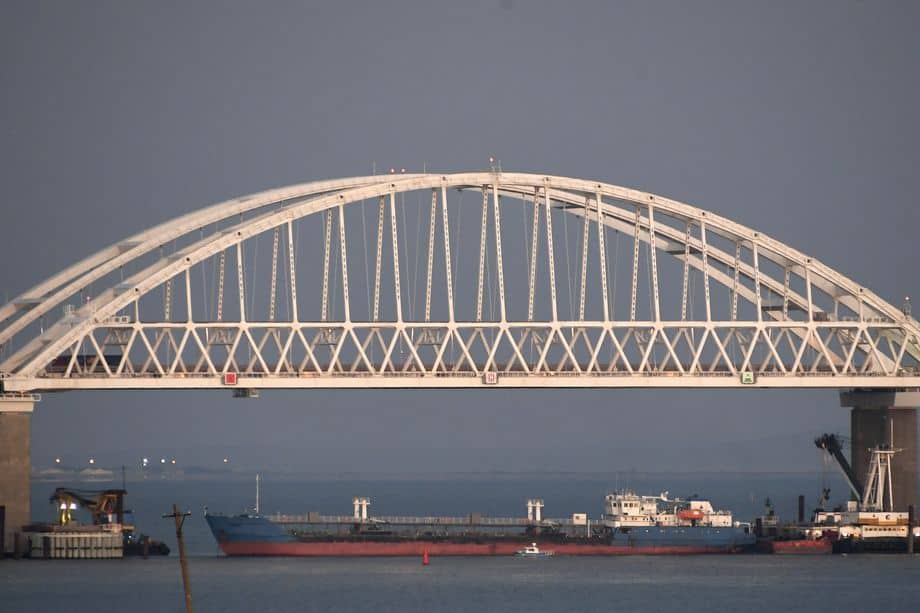
Although the uproar over Russia’s November 25th naval attack on three Ukrainian ships has receded from the headlines — just as Russian President Vladimir Putin surely wishes — the attack represents a major escalation of Russia’s until-now low-intensity war against the Ukraine. The US, the EU, and NATO cannot afford to let Russia’s aggression stand without an appropriate response. Foreign Affairs takes note of
Russian aggression that has been carefully calibrated to cause maximum damage while avoiding the crippling costs implicit in a more conventional campaign. Russia’s hybrid hostilities have extended far beyond the country’s thinly veiled military intervention in eastern Ukraine, with Moscow also making use of targeted assassinations, cyberattacks, trade embargoes, and disinformation campaigns to keep Ukraine permanently destabilized and to prevent the country’s final escape from the Kremlin’s sphere of influence. Throughout it all, the one constant has been a desire to disguise Russian involvement.
Russia’s now open aggression against the Ukraine is a threat to Europe, especially Eastern Europe, and to NATO. It is a clear violation of the 1994 Budapest Agreement signed by the three nuclear powers — the US, the UK, and the Russian Federation. The Agreement enjoins the signing parties to
* Respect Belarusian, Kazakh and Ukrainian independence and sovereignty and the existing borders.
* Refrain from the threat or use of force against Belarus, Kazakhstan and Ukraine.
* Refrain from using economic pressure on Belarus, Kazakhstan and Ukraine in order to influence its politics.
*Seek immediate United Nations Security Council action to provide assistance to Belarus, Kazakhstan and Ukraine “if Belarus/Kazakhstan/Ukraine should become a victim of an act of aggression…”
NATO and EU wobbling
Twenty-four Ukrainian sailors remain in Russian captivity. NATO has not been able to agree on a unified response. This will undoubtedly serve as a green light to Russian President Putin to continue and even further escalate Russian aggression. Newsweek reports that
Russia has moved ground units nearer its border with Ukraine in recent days, according to an ISW [Institute for the Study of War] report, and deployed new ships to the Black Sea under the auspices of preparing for training exercises.

The Russian war against the Ukraine began in 2014 with the incursion of disguised Russian soldiers into the Russian-speaking eastern Ukraine and the seizure of the strategic peninsula of Crimea. In response, economic sanctions were levied against Russia by the EU, US, Canada, and others. The sanctions have hurt the Russian economy, but Russia hopes to escape their effect by taking advantage of the EU’s attempt to escape the Trump administration’s separate sanctions against Iran. The EU plan is to set up a payment mechanism independent of dollar-clearing institutions, but this will be used by Putin as well — to escape Western sanctions against Russia. This is a strong argument for the EU to abandon its attempts to buck the US embargo of Iran — if it cares at all for the defense of Europe against Russian aggression.
Backfire: hatred of Russia increases
The Putin administration does not seem to care that it has converted a Ukrainian population that once had just mixed feelings about Russia into a situation where now it is hatred by a majority of the Ukrainian population. War refugees from the eastern Ukraine who once proudly spoke Russian have abandoned it for Ukrainian. Ukraine’s Orthodox Church has split from the Moscow-centered Russian Orthodox Church, ending the latter’s centuries-old influence over Ukrainian belief. Crimea’s Muslim Tatars are now being treated by Russia the way Russia’s new ally China is treating its Muslim Uighur population. This casts Russia’s Muslim allies — Turkey, Syria, Iran, and some of the “stans” — in a harsh light.
Russia’s present oppression of the Ukraine and the Tatars provokes those peoples’ collective memory of Putin’s predecessor, Joseph Stalin, whose regime starved or shot as many as ten million Ukrainians in the Holodomor and caused the death of 20 to 46 percent of the Crimean Tatar population when he deported them from their homeland to Siberia.
Military or diplomatic response? Neutralization?
How should the US respond to Putin’s attempt to paralyze and dismember an independent pro-Western nation? The Trump administration is supplying Javelin missiles, a defensive weapon system, to the Ukraine, and the navy has begun preparations to send a warship into the Black Sea.
But the Cato Institute’s senior fellow for defense and foreign policy studies, Ted Galen Carpenter, is worried that the US may stumble into a shooting war. He puts much of the blame for the Kerch crisis on the Ukraine’s Poroshenko administration.
The Washington Times has a very interesting proposal for the neutralization of the Ukraine. This could defuse a serious war threat and be Putin’s escape hatch from punishing economic sanctions. Admittedly, diplomacy isn’t the strong suit of either the Trump or Putin administration, and if the EU leads the effort, it’s likely to give away the store. Any suggestions, Secretary Pompeo and National Security Advisor Bolton?

Leave a Reply